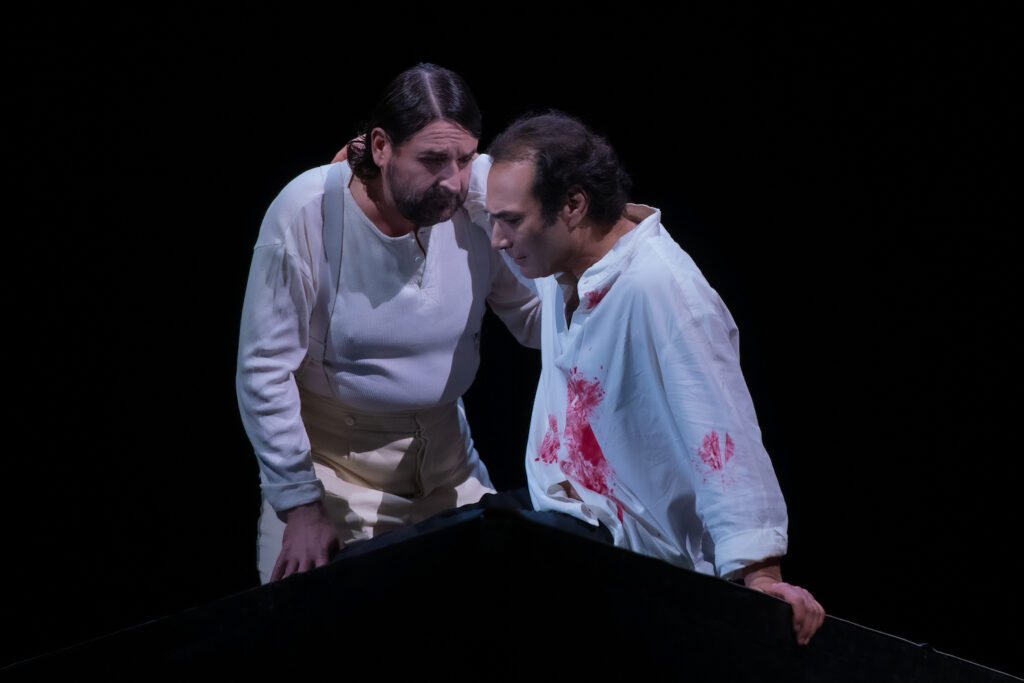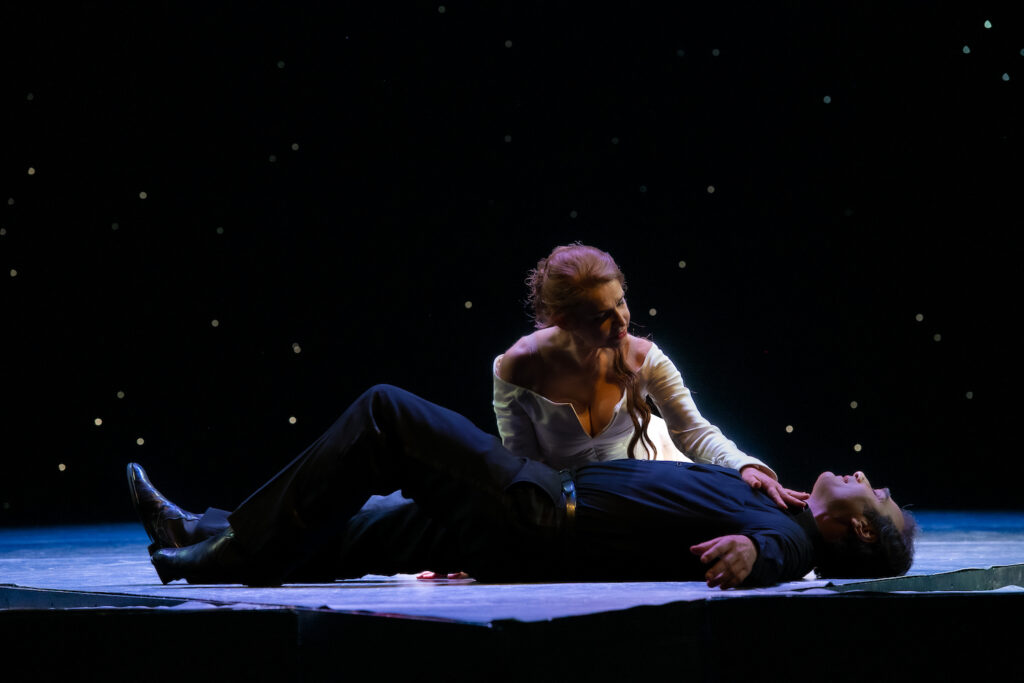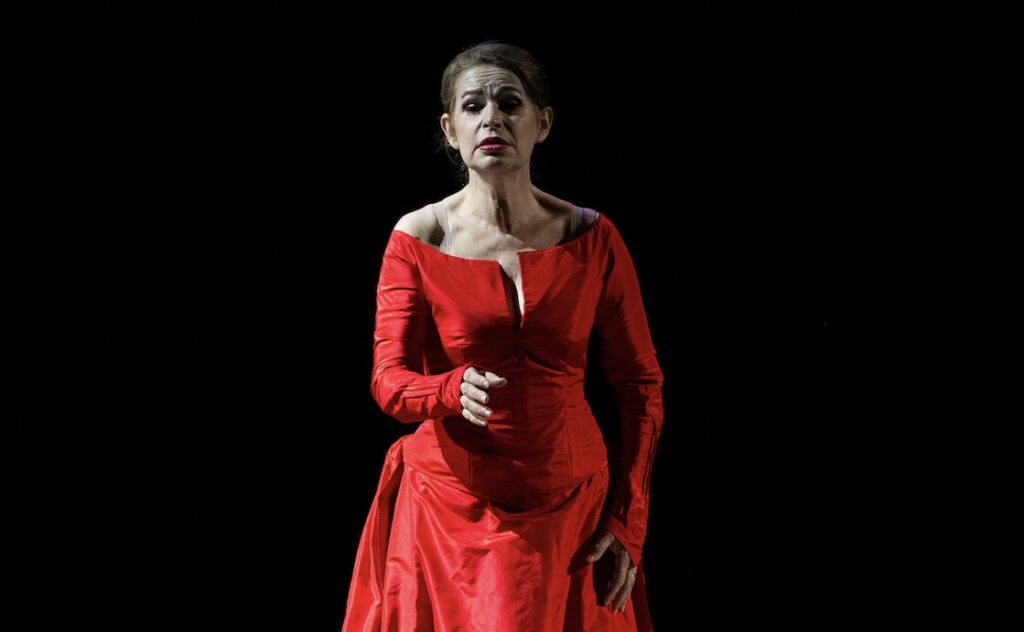Well beyond all Tristan basics the Opéra de Toulouse boasted two ravishing singers and an electrifying conductor in this revival of its excellent 2007 Nicolas Joël production.
Austrian tenor Nikolai Schukoff and French mezzo soprano Sophie Koch, both in their role debuts, brought radical physical presence to Tristan and Isolde, a presence that amplified the power of the words they spoke. Wagner’s poem of the doomed medieval lovers thus assumed vibrant new colors that were passionately extolled by German conductor Frank Beermann in an equally radical approach to the orchestral realization of Wagner’s poem.
The Joel production reads the poem as an intense dramatic action, Brangäne is a powerful player, who alternates with Isolde’s raging on the tip of the stage floor that juts out over the Theatre du Capitole’s orchestra pit to boldly rationalize Tristan’s gift of Isolde to Marke. Enacted by French mezzo soprano Anaïk Morel (a sometime Carmen), she is of powerful voice, embodying both maternal power and its blind love. Her second act warnings are anxious interventions, her third act confession is conspicuously contrite.

Kurvenal, sung by French baritone Pierre-Yves Pruvot (a sometime Iago), is Tristan’s sharp voiced, high spirited squire who sets off the fireworks of the tense first act Isolde Tristan confrontation. He anxiously hovers over Tristan in the third act, negotiating forcefully with the brusque, on-stage shepherd as to the tones of the shepherd’s pipe, comforting the distraught Tristan with touching, almost paternal intimacy.
The Joel telling of the poem interchanges these very realistic physical intimacies with highly choreographed action movement, and with symbolic statements — Morold has been killed by sword, Isolde’s revenge is by sword, the act two lantern is a lighted sword, Merlot wounds Tristan by sword, Kurvenal kills Merlot by sword and dies by self inflicted sword. These swords, symbolizing both love and death, are abstractly present and highly dramatic, though they are only presented, never used.
Marke, sung by venerable German baritone Matthias Goerne (once a Kurvenal himself), expounded his second act distress as an intimate, riveting art song. Significantly he was not on the tip of the thrusting stage floor for this magisterial delivery, but up-stage from where he could alternately gaze at both Tristan and Isolde, now far apart downstage, creating the tragic triangle of love, loyalty and betrayal.
Conductor Beermann established the poem’s inexorable day/night, love/death tension from the first moments of Wagner’s famed overture, urging the disturbing harmonies, and the astringent oboe tones to clash with the warmth of the clarinet, and the lushness of the strings. His tempos allowed the words ample space, all tensions created in the tonal relationships. The orchestra of the Theatre du Capitole was to become a major player in the exposition of Wagner’s poem, its myriad Wagnerian colors completely unveiled in the clarity of this theater’s famed acoustic. If the on-stage performances were vivid, the pit was equally vivid.
The leitmotifs rang out to reinforce the poem’s themes, and the fortes were gigantic in the delirium of the recognitions of the fateful love on stage, Tristan and Isolde finding levels of volume only made possible by a love so towering and tortured that it was impossible. The performances by Schukoff and Koch were over the top, Mme. Koch finding mighty tones to express her fury at Tristan, surmounting the extremes of the dramatic soprano range with complete confidence, Mr. Schukoff never losing the colored, clarion timbre and control of his voice even in the moments of surpassing ecstasy.

Consumate actors, Mme. Koch found the carelessness of blind love at the beginning of the second act, equaled by Mr. Schukoff when he arrived for the tryst. A scene of tender, physical intimacy ensued with a disarming naturalness. As their declarations became evermore impassioned they were, however, driven apart dramatically to voice individually the sublime raptures of love. Thus apart they were positioned at the moment of climax, but it was the entrance of Mark, not the consumption of love.
The third act began with the stage shrouded by a black drape, disappearing to reveal the wounded Tristan hanging dangerously over the platform that thrust over the pit. When the shepherd’s piping began it was from the heights of the balconies, the piping sounds continued even after the initial solo, this plaintive voice accompanying Tristan’s extended confession from a vast, abstract distance. It was an amazing and powerful acoustical coup de théâtre.
Tristan’s delirium was portrayed in very intimate terms, its tortures wrenchingly enacted by Mr. Schukoff, its climaxes were ecstatic visions indeed. The Tristan death is not a huge musical moment, but a quiet passage. When Isolde recognized that he was no longer of this world, she knelt behind his body where she too found passage to the place, death, of eternal love. Mme. Koch thus assumed a supernatural stillness, though she arose finally to sing her Liebestod, alone on the thrusting tip of the stage. At the final tones of her prayer she froze with outstretched arms, a position she held, transcended, until the curtain fell.

The Nicolas Joel production was designed by Andreas Reinhardt who died in 2007, the year of this production. Mr. Reinhardt came originally from the Berliner Ensemble. His set for the Joel production is nothing more than a floor and a back wall. The floor was sentient, with changing colorations, its three platforms able to change positions, even to move in sympathy with the poem. The back wall was a starry sky for the second act, Venus shining brightly as needed, Mars and other symbolic stars brightening as well from time to time. Mr. Reinhardt’s costumes were in primary shapes and colors, Isolde in a white gown with bright red stockings, though for the Liebestod the white gown transcended into bright red, Tristan in a black, loose fitting shirt that allowed Mr. Schukoff’s virile, heroic physique ample visibility.
Melot was sung by Damien Gasti, tenor Valentin Thill made a big impression as the Shepherd as well as the voice of the sailor that begins the opera. The splendid English horn solos were performed by Gabrielle Zaneboni who took her bows along side the principals.
Fittingly the Orchestre national du Capitole moved in mass from the pit to the stage to take its well earned solo bow.
The program sheet provided by the Opéra national Capitole Toulouse does not provide credits for those who realized this staging of the Nicholas Joël production — Mr. Joël died in 2020. It was a huge accomplishment to integrate these extraordinary artists assembled by the Opéra national Capitole Toulouse into this production, fulfilling, certainly, an ideal that Nicolas Joel may have only imagined.
Michael Milenski
Théâtre du Capitole, Toulouse, France, March 1, 2023. Photo credit: Mirco Magliocca.